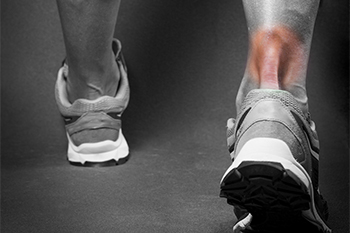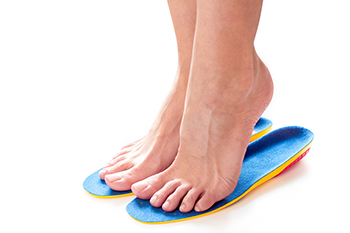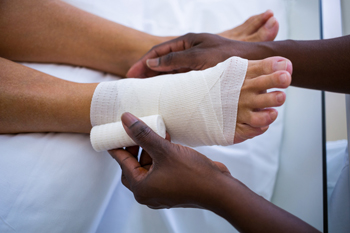
Achilles tendon injuries are becoming more prevalent, affecting young individuals with acute ruptures and older adults with chronic conditions. Acute ruptures are often related to high-energy sports in younger individuals and low-energy events in older patients. A missed diagnosis is not uncommon. Risk factors for Achilles tendon ruptures may include fluoroquinolone antibiotic use, rheumatoid arthritis, gout, and other medical conditions. Diagnosis involves a thorough physical examination, and sometimes an ultrasound, to confirm findings. Non-surgical management is increasingly favored for acute ruptures, with evidence showing good outcomes. This involves early immobilization and rehabilitation. Chronic conditions such as Achilles tendinopathy can benefit from early intervention and exercise. For more severe cases, surgery may be necessary. If you have injured your Achilles tendon, it is suggested that you make an appointment with a podiatrist who can provide you with a proper diagnosis and a tailored treatment plan.
Achilles tendon injuries need immediate attention to avoid future complications. If you have any concerns, contact one of our podiatrists of Farah Podiatry Associates. Our doctors can provide the care you need to keep you pain-free and on your feet.
What Is the Achilles Tendon?
The Achilles tendon is a tendon that connects the lower leg muscles and calf to the heel of the foot. It is the strongest tendon in the human body and is essential for making movement possible. Because this tendon is such an integral part of the body, any injuries to it can create immense difficulties and should immediately be presented to a doctor.
What Are the Symptoms of an Achilles Tendon Injury?
There are various types of injuries that can affect the Achilles tendon. The two most common injuries are Achilles tendinitis and ruptures of the tendon.
Achilles Tendinitis Symptoms
Rupture Symptoms
Treatment and Prevention
Achilles tendon injuries are diagnosed by a thorough physical evaluation, which can include an MRI. Treatment involves rest, physical therapy, and in some cases, surgery. However, various preventative measures can be taken to avoid these injuries, such as:
If you have any questions please feel free to contact our office located in Trenton, MI . We offer the newest diagnostic tools and technology to treat your foot and ankle needs.

It is generally safe for individuals to have outpatient foot and ankle surgeries at freestanding ambulatory surgery centers, a phenomenon becoming more common in the podiatry field. This trend offers cost savings and efficiency compared to traditional hospital settings. Because of unique postoperative challenges, it is necessary to make sure these facilities can handle such procedures. Foot and ankle surgeries can carry a higher risk of infection, with diabetes as a common comorbidity, and blood clots, perhaps from swift patient discharge. If you are facing foot surgery, it is suggested that you make an appointment with a podiatrist to see if outpatient surgery will work for you.
Foot surgery is sometimes necessary to treat a foot ailment. To learn more, contact one of our podiatrists of Farah Podiatry Associates. Our doctors will assist you with all of your foot and ankle needs.
When Is Surgery Necessary?
Foot and ankle surgery is generally reserved for cases in which less invasive, conservative procedures have failed to alleviate the problem. Some of the cases in which surgery may be necessary include:
What Types of Surgery Are There?
The type of surgery you receive will depend on the nature of the problem you have. Some of the possible surgeries include:
Benefits of Surgery
Although surgery is usually a last resort, it can provide more complete pain relief compared to non-surgical methods and may allow you to finally resume full activity.
Surgical techniques have also become increasingly sophisticated. Techniques like endoscopic surgery allow for smaller incisions and faster recovery times.
If you have any questions please feel free to contact our office located in Trenton, MI . We offer the newest diagnostic and treatment technologies for all your foot and ankle needs.

Custom orthotics provide numerous advantages for athletes, which can profoundly impact their performance and physical well-being. These specialized insoles are tailored to the individual's unique foot structure and biomechanics, offering a precise fit that cannot be achieved with off-the-shelf alternatives. One of the primary benefits of custom orthotics is foot and ankle pain reduction. They distribute weight evenly, align bones and muscles, and alleviate stress on sensitive or injured areas. Moreover, custom orthotics promote enhanced athletic performance by ensuring proper foot alignment, preventing muscle overcompensation, and absorbing shock during physical activities. This not only aids endurance but also supports the knees, hips, and back. Furthermore, these personalized inserts significantly lower the risk of sports-related injuries by addressing specific biomechanical issues and providing tailored support. If you are an athlete seeking to improve your comfort and performance, it is suggested that you make an appointment with a podiatrist to discuss whether custom orthotics can help you.
If you are having discomfort in your feet and would like to try orthotics, contact one of our podiatrists from Farah Podiatry Associates. Our doctors can provide the care you need to keep you pain-free and on your feet.
What Are Orthotics?
Orthotics are inserts you can place into your shoes to help with a variety of foot problems such as flat feet or foot pain. Orthotics provide relief and comfort for minor foot and heel pain but can’t correct serious biomechanical problems in your feet.
Over-the-Counter Inserts
Orthotics come in a wide variety of over-the-counter inserts that are used to treat foot pain, heel pain, and minor problems. For example, arch supports can be inserted into your shoes to help correct overarched or flat feet, while gel insoles are often used because they provide comfort and relief from foot and heel pain by alleviating pressure.
Prescription Orthotics
If over-the-counter inserts don’t work for you or if you have a more severe foot concern, it is possible to have your podiatrist prescribe custom orthotics. These high-quality inserts are designed to treat problems such as abnormal motion, plantar fasciitis, and severe forms of heel pain. They can even be used to help patients suffering from diabetes by treating foot ulcers and painful calluses and are usually molded to your feet individually, which allows them to provide full support and comfort.
If you are experiencing minor to severe foot or heel pain, it’s recommended to speak with your podiatrist about the possibilities of using orthotics. A podiatrist can determine which type of orthotic is right for you and allow you to take the first steps towards being pain-free.
If you have any questions please contact our office located in Trenton, MI . We offer the newest diagnostic and treatment technologies for all your foot and ankle needs.

There are many types of foot infections and they can be from a host of causes having to do with biomechanics of the feet and underlying health conditions. Patients with foot wounds often have diabetes, peripheral vascular disease, or other metabolic conditions. However, foot infections can also result from traumatic injuries or tissue loss, leading to contamination by foreign materials and bacteria formation. Over time, treatment approaches to foot infections have evolved, influenced by advancements in pharmacology and medical technology with the goal of preserving limbs. Plastic and reconstructive procedures have revolutionized the management of certain foot infections. The primary objectives now include restoring functionality and significantly reducing the need for amputations. These developments represent a promising shift in the management of foot infections, offering hope for improved outcomes in patients facing these challenging conditions. If you have a foot infection or wound, it is suggested that you make an appointment with a podiatrist as soon as possible to determine the cause of the wound and the best way to deal with it.
Wound care is an important part in dealing with diabetes. If you have diabetes and a foot wound or would like more information about wound care for diabetics, consult with one of our podiatrists from Farah Podiatry Associates. Our doctors will assess your condition and provide you with quality foot and ankle treatment.
What Is Wound Care?
Wound care is the practice of taking proper care of a wound. This can range from the smallest to the largest of wounds. While everyone can benefit from proper wound care, it is much more important for diabetics. Diabetics often suffer from poor blood circulation which causes wounds to heal much slower than they would in a non-diabetic.
What Is the Importance of Wound Care?
While it may not seem apparent with small ulcers on the foot, for diabetics, any size ulcer can become infected. Diabetics often also suffer from neuropathy, or nerve loss. This means they might not even feel when they have an ulcer on their foot. If the wound becomes severely infected, amputation may be necessary. Therefore, it is of the upmost importance to properly care for any and all foot wounds.
How to Care for Wounds
The best way to care for foot wounds is to prevent them. For diabetics, this means daily inspections of the feet for any signs of abnormalities or ulcers. It is also recommended to see a podiatrist several times a year for a foot inspection. If you do have an ulcer, run the wound under water to clear dirt from the wound; then apply antibiotic ointment to the wound and cover with a bandage. Bandages should be changed daily and keeping pressure off the wound is smart. It is advised to see a podiatrist, who can keep an eye on it.
If you have any questions, please feel free to contact our office located in Trenton, MI . We offer the newest diagnostic and treatment technologies for all your foot care needs.